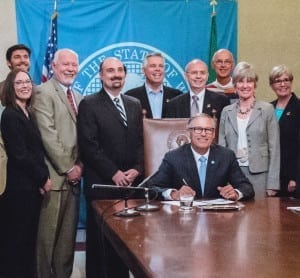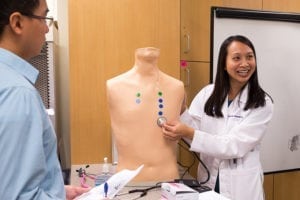Setting the Curricular Innovation Sail
Pharmacists are now recognized as health care providers in Washington State and beyond, so when we reflect on what it means to provide unparalleled pharmacy education, we envision a curriculum that impacts the world in profound ways. The US healthcare tides are changing—caused by ripple effects from the Affordable Care Act and shifting industry trends. As innovators in pharmacy education, we have set sail towards a new curriculum designed to prepare provider pharmacists, competent to support the needs of the public and the future health care system.

The UW School of Pharmacy (UWSOP) is a global leader in education and research, an advocate for progressive health laws regionally and nationally, and a collaborative partner with a pioneering practice community. As such we are ready and uniquely positioned to be the flagship of modern pharmacy education. We dare to do this in order to train world-class pharmacists who are ready to practice at the top of their license and are agile leaders at the forefront of patient-centered medical care.
Changing Tides in Healthcare
 Every day, we ask ourselves about the impact of personalized medicine on patient care, and how we can contribute to solutions. What does that mean for the future of pharmacists and pharmaceutical researchers? How do we model and anticipate the changes in the U.S. healthcare system as the Affordable Care Act continues to grow? What role do pharmacists play on the health care team?
Every day, we ask ourselves about the impact of personalized medicine on patient care, and how we can contribute to solutions. What does that mean for the future of pharmacists and pharmaceutical researchers? How do we model and anticipate the changes in the U.S. healthcare system as the Affordable Care Act continues to grow? What role do pharmacists play on the health care team?
As pharmacists step into their most complex roles ever, there is a compelling need to assess our training and education models. Pharmacist roles are expanding as a very different collaborative paradigm is emerging—that of pharmacists teaming with physicians, nurses, and other provider colleagues while acting fully in direct patient care provider roles. Pharmacists are seeing patients routinely to provide health promotion and care services, actively managing medication use, collaborating across disciplines, and assuring medication safety and continuity between settings of care.
UWSOP and Washington: Healthcare Innovators

Not only are UWSOP researchers at the forefront of innovation—for example, working on solutions to create customized drugs based on a patient’s genetic background—our faculty and students are impactful advocates for modernizing healthcare policy and pharmacy practice.
The UWSOP has long advocated for the expansion of the role of pharmacists in health care, including collaborative prescriptive authority in 1979, pharmacist-provided vaccinations (now available in all 50 states), emergency contraception and more, all of which began in Washington State. For more than 15 years, UWSOP students and faculty, including Institute of Innovative Pharmacy Practice (I2P2) Endowed Clinical Professor Don Downing, have been instrumental in generating these progressive changes.
Washington State continues to create breaking waves in health care innovation. Washington was the first state in the country to require that commercial health insurance plans include pharmacists in their provider networks. In 2016, Washington became the first state to fully include pharmacists as care providers on the health care team in health systems—and patient access to pharmacists will continue to grow in the coming years.

Patients will see increased access to care from pharmacists operating within their scope of practice, just like nurse practitioners and physician assistants. Rural and underserved communities that struggle with primary care providers who are in short supply and overburdened will be better served. People living with chronic illnesses will have access to medication experts. Five percent of patients consume 50% of healthcare expenses, much of which comes from the costs of managing chronic illnesses such as diabetes, hypertension and congestive heart failure. While pharmacists won’t diagnose and won’t replace the doctor’s role in acute care, they will be a more integral part of important health promotion, care and follow-up services.
The phased implementation begins in 2016 within health systems and in 2017 with service reimbursements for services provided by licensed pharmacists who meet the credentialing requirements. The law does not apply to Medicare, Medicaid or TriCare plans and applies strictly to pharmacists in a clinical setting (not to the work of dispensing medication), including educating patients about their medications or answering any questions.
The wake from reforms in our state create the perfect environment for a progressive practice community to flourish, and through established and prospective clinical partnerships, the UWSOP has a top-notch crew ready to steer into the 21st century to best educate, train, and support future pharmacists in pharmacy practice.
